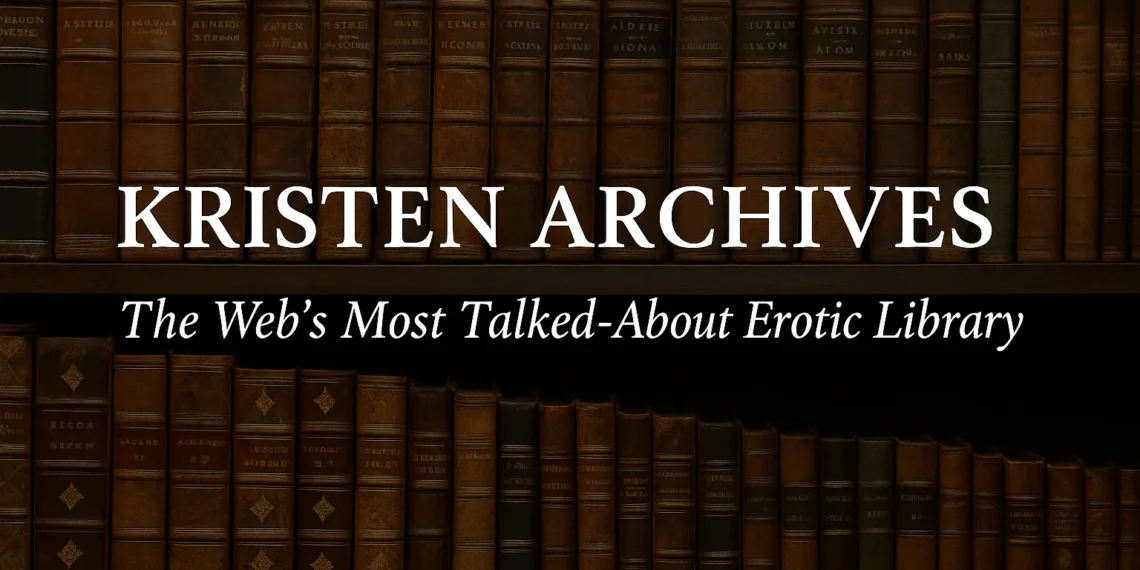Kristen Archives: A Comprehensive Exploration
The world of online literature is vast, stretching across countless genres, styles, and archives. Among these collections, one of the most frequently discussed is Kristen Archives, a digital repository that has become a touchstone for readers and researchers alike. With its unique place in online history, it represents more than just stories—it reflects the evolution of internet communities, shifting cultural perspectives, and the enduring demand for diverse narratives.
This article dives deep into its origins, structure, themes, and cultural significance, offering readers a balanced and informative overview.
The Origins of Digital Archives
Before diving into the specifics, it’s important to understand the concept of digital archives in general. These collections began to emerge in the early days of the internet when enthusiasts and hobbyists started curating stories, documents, and user-generated content in one place. Unlike traditional libraries, digital archives could be accessed globally and provided an opportunity for individuals to explore niche genres or specific communities of interest.
Kristen Archives emerged during this wave of grassroots digital curation, reflecting both the passion of its creators and the appetite of its audience for freely available, easily accessible literature.
What Makes Kristen Archives Unique
Every archive has its own identity, and Kristen Archives stands out for several reasons:
-
Community-driven collection – Unlike curated academic archives, this collection often featured submissions from writers across the globe, creating a diverse mix of styles.
-
Expansive genres – Its library covered a wide spectrum of themes, giving readers an extensive choice.
-
Longevity – Despite changes in the online landscape, it has remained a recognizable name, largely due to the loyalty of its community.
The sense of inclusivity and openness helped it gain a reputation beyond just being an archive—it became a cultural touchstone for a generation of internet users.
The Role of Storytelling in Digital Communities
At its core, Kristen Archives represents the power of storytelling. Stories have always been the backbone of human connection, passing values, lessons, and emotions from one generation to another. The digital age simply provided a new medium for these timeless traditions.
Readers flocked to such archives for several reasons:
-
Accessibility – Stories were available at any time, from anywhere.
-
Variety – Instead of being restricted to mainstream publications, readers could find unique, unconventional voices.
-
Anonymity – The internet allowed readers and writers to explore freely without fear of judgment.
Through these elements, Kristen Archives became more than a repository—it became a community where creativity thrived.
Cultural Impact and Relevance
While it might appear to be “just an archive,” Kristen Archives carries cultural significance. It demonstrates how people seek connection through shared narratives, especially in spaces outside of mainstream publishing.
-
Preservation of voices – It has kept alive works from writers who might never have found an audience otherwise.
-
Reflection of trends – The collection offers a snapshot of what readers and writers valued at particular times in internet history.
-
Global reach – Because it existed online, it transcended borders and cultural barriers, welcoming contributions from different backgrounds.
In essence, archives like this helped shape the internet’s role as a cultural equalizer, giving ordinary people the chance to share their voices alongside more established writers.
Challenges and Controversies
Like many online repositories, Kristen Archives has faced challenges over the years. Some of these include:
-
Copyright concerns – With thousands of submissions, ensuring every piece respected intellectual property rights was difficult.
-
Content moderation – Balancing inclusivity with responsibility is always a challenge for open digital collections.
-
Changing platforms – As the internet evolved, keeping the archive accessible across new devices and technologies posed technical challenges.
Despite these hurdles, its endurance demonstrates the resilience of community-driven platforms.
The Evolution of Online Archives
Kristen Archives is part of a broader story about how online archives evolved. Initially, these collections were static websites with simple designs, often maintained by individuals rather than institutions. Over time, they became more sophisticated, integrating search functions, categorization, and improved navigation.
Some archives moved toward formal publishing platforms, while others remained grassroots in spirit. Kristen Archives stayed true to its origins, keeping an emphasis on free access and community participation.
Why People Still Talk About Kristen Archives
Even today, in an era where digital libraries and eBooks dominate, Kristen Archives is often remembered and referenced. This continued recognition highlights its impact and relevance.
-
Nostalgia – For early internet users, it represents a formative part of their digital journey.
-
Historical importance – It offers a lens into how online communities once functioned and what they valued.
-
Literary experimentation – Many writers used the archive to test ideas or develop their voice before moving on to more formal publishing avenues.
The fact that its name remains widely known underscores the archive’s enduring place in online culture.
Exploring the Broader Significance
Looking beyond Kristen Archives, we can see how digital archives have shaped the modern world:
-
Educational value – Students and researchers often turn to archives to understand cultural trends.
-
Freedom of expression – They exemplify the democratization of publishing, giving anyone a platform.
-
Technological milestones – Early archives showcase the humble beginnings of today’s advanced digital ecosystems.
Kristen Archives is one piece of this puzzle, but a significant one that demonstrates the interplay between culture, technology, and community.
The Future of Digital Story Archives
As we move into the age of artificial intelligence and increasingly interactive platforms, the role of archives like Kristen Archives may continue to evolve. New technologies allow for:
-
Smarter categorization – AI can make searching and organizing more efficient.
-
Interactive storytelling – Stories might become immersive experiences rather than just text.
-
Global collaboration – Writers and readers from different corners of the world can connect more seamlessly.
Yet, despite technological change, the essence remains the same: people will always crave stories, and archives will always have a role in preserving and sharing them.
Conclusion: Why Kristen Archives Still Matters
In a digital world that changes rapidly, it’s rare for an online project to maintain relevance over decades. Kristen Archives achieved this by offering more than just a library of stories—it provided a space where creativity, diversity, and community could thrive.
By understanding its history and cultural impact, we recognize the importance of preserving such archives for future generations. They remind us that literature is not just about polished books in bookstores but also about the countless voices contributing to shared human experiences.
Kristen Archives remains a symbol of how online communities can shape culture, connect people, and keep storytelling alive in an ever-changing digital age.








